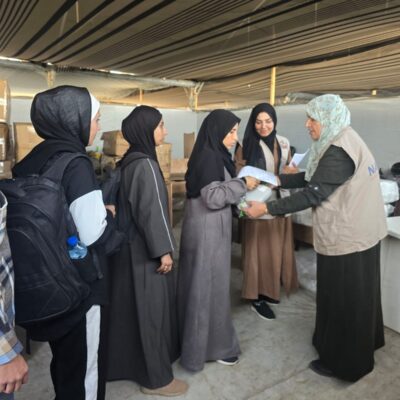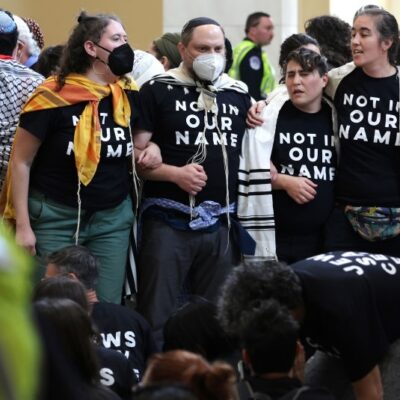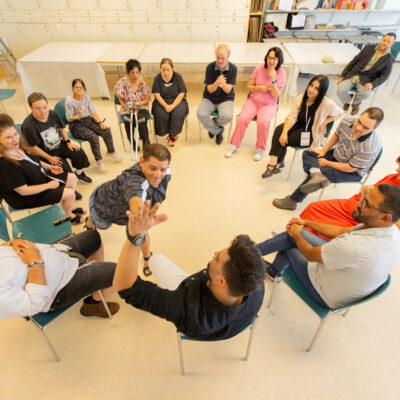Opinion
ADAPTIVE MINDSET
10 tips for nonprofit survival during a crisis
Between weakening government support, growing culture wars and surging public need, many nonprofit leaders today are operating under enormous strain. For Jewish nonprofits in particular, this is piling on top of the trauma of Oct. 7, the ongoing war and hostage crisis, and a variety of other challenges facing Israeli society, including the recent wildfire. For nonprofit leaders, it’s like trying to win a poker game while holding a weak hand against players with aces up their sleeves, but we can’t afford to fold.
Jewish nonprofits need to adapt and rise. As someone who led a nonprofit for nearly two decades and has supported dozens more as a longtime funder, I offer these urgent tips for nonprofit leaders preparing for the challenges ahead:

Chechotkin/Adobe Stock
1. The world has changed dramatically. Your nonprofit must change with it.
Now is the time to revisit your mission, strategy, theory of change, staffing model and budget. Consider whether your team needs to shift focus — perhaps placing more emphasis on volunteer management, fundraising or digital mobilization.
Engage your stakeholders, especially those you serve and those who fund you. Use online surveys, focus groups and town halls to learn their most pressing concerns and best ideas for the road ahead. These should be moments of listening, planning and team-building. The sooner you engage, the better prepared you’ll be.
2. Don’t go it alone: Build or join coalitions.
No single nonprofit can meet today’s challenges alone. The most effective groups are building strong alliances — with other nonprofits, faith leaders, academic institutions, and community networks. Collaborate to divide the labor, share resources, set timelines and hold each other accountable. These coalitions must meet regularly, stay flexible and adjust as events evolve.
3. Prepare now for financial uncertainty.
Government funding has already been slashed. Markets could drop more. Tens of thousands of donors have lost their jobs. The bottom line is that every nonprofit team needs contingency plans in place for different financial scenarios. Create backup budgets. Explore alternative revenue sources. Get ready before you have to.
At the same time, act as if it’s November or December and lock in your end of year pledges or gifts now.
4. Make sure your nonprofit is accessible, because 1 in 4 adults has a disability.
Disability inclusion is not just the right thing to do — it’s a strategic imperative. Roughly 25% of adults in America live with a disability. Your nonprofit cannot afford to miss out on the talents, insights, donations and lived experience of this vital segment of the workforce and community.
Start by assessing your physical and digital accessibility. Are your events and websites usable for people who are blind, deaf, have mobility impairments, or neurodivergent needs? Use tools like the ADA Checklist for Existing Facilities and consult with disability-led organizations for guidance.
Ensure your communications use plain language, alt-text, captions, and screen reader-friendly formats. Inclusion also means having disabled leaders at the table setting strategy, shaping programs and making decisions.
Accessible and inclusive nonprofits are stronger nonprofits.
5. Tap into skilled workers who have recently lost their jobs.
The federal government and many major institutions have shed thousands of highly qualified professionals. Many of these workers — scientists, researchers, IT specialists, policy analysts — are seeking purpose while searching for their next job.
Invite them in as volunteers, fellows or advisors. They bring incredible talent and fresh perspectives. In return, they get to use their skills, expand their networks, and stay mentally engaged. It’s a win-win. Partner with job placement programs and professional associations to reach them.
6. Build a climate resilience team, because extreme weather is coming.
Floods, wildfires, droughts, extreme heat, hurricanes and high winds aren’t just environmental issues. As we have seen with the wildfires in southern California and now Jerusalem, they are human service emergencies.
Whether its work is focused on education, food, disability services or civil rights, every nonprofit needs to build a resilience plan. What happens when your region faces a disaster? Who’s responsible for continuity of services? How do you communicate with clients, staff and funders?
Work with local emergency management agencies. Train staff. Build partnerships. Get ahead of the next crisis before it hits.
7. Make sure your nonprofit has a complete and up-to-date profile on Candid.
Candid (formerly GuideStar and Foundation Center) is a trusted nonprofit database used by foundations, corporate funders, and major donors to research where and how to give. It’s a key place where funders go to understand your mission, impact, financials, and leadership. If your organization doesn’t have a profile (or hasn’t updated it in the last year), do it now.
Beyond the profile, Candid’s website also offers a robust array of training, data and tools to help nonprofits grow and sustain their fundraising efforts. If your development team isn’t already familiar with it, make that a priority.
8. Consider a one-time bonus to help staff prepare for possible shortages.
As geopolitical tensions escalate, tariffs and global supply disruptions may lead to medication shortages and price spikes, especially on imported goods. Many nonprofit workers live paycheck to paycheck. Consider giving each employee a one-time bonus so they can stock up on medications and essentials. It can help them feel secure — and ready to serve. It’s a small step that shows care during uncertain times.
9. The world is moving fast. Your organization must be nimble and resilient.
This is a time of disruption and opportunity. The strongest organizations will be those that are proactive, flexible and inclusive. Plan your work and work your plan. Involve your donors, partners, board and staff now — not after a crisis hits.
Yes, the road ahead may be rocky. But this is exactly the moment when nonprofits and the people who lead them can rise with clarity, compassion and courage.
Let’s get ready.
Jennifer Laszlo Mizrahi is the co-founder of the Mizrahi Family Charitable Fund, which focuses on educating the press, public and policy makers on real solutions for addressing climate change and disability access and employment, human services and a strong Jewish community.

 Add EJP on Google
Add EJP on Google










